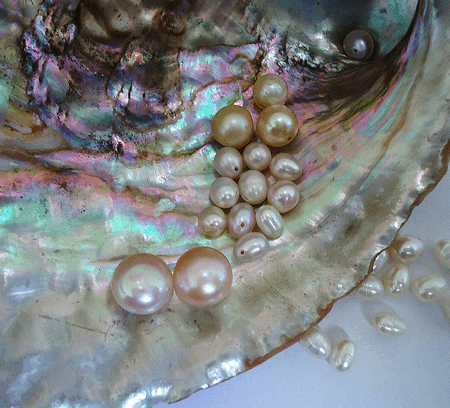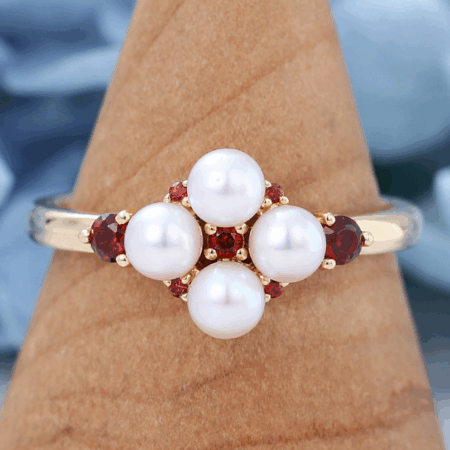What Do Pearls Symbolize? Exploring Their Meaning in Today’s World
For centuries, pearls have been admired for their delicate beauty and quiet elegance—but their appeal goes far beyond the surface. What Do Pearls Symbolize in today’s world, where tradition meets modern expression?
What's A Pearl?
The definition of pearl is a natural organic gemstone with a smooth and delicate surface and a soft luster. It is mostly round and is often used to make various jewelry. Pearls represent purity and elegance. They are a classic gemstone loved by many people and are highly valued for their natural and warm beauty.
How Are Pearls Formed? What Is Mother Of Pearl?
Pearls are natural gems formed in certain mollusks, which secrete a layer of nacre to encapsulate irritants, gradually forming smooth pearls with a unique luster. Pearls are considered precious ornaments because of their natural beauty and rarity.
Mother of Pearl is the nacre in the inner layer of the mollusk shell, also known as the mother-of-pearl layer, with a smooth surface and a rainbow-like luster. It is not only the basic material for the formation of pearls, but its significance is reflected in many aspects: as a decorative material, mother of pearl is widely used in jewelry, crafts and furniture decoration with its unique color and texture, and is deeply loved by people.
Pearl Colors And Types
White Pearls–Symbolize purity and grace; white pearl meaning is often linked to innocence and sincerity.
Black Pearls–Represent strength and depth; the meaning of black pearls reflects mystery and resilience.
Pink Pearls–Soft and feminine; pink pearls are classic ones, and pink pearls meaning is tied to love and emotional healing.
Golden Pearls–Signify wealth and luxury, favored for their warm, regal glow.
Silver Pearls–Associated with modern elegance and calm, ideal for understated style.
Blue Pearls–Reflect intuition and calmness, often chosen for their peaceful aura.
Lavender Pearls–Symbolize creativity and serenity, offering a gentle, unique charm.
Akoya Pearls–Known for their high luster and classic round shape, perfect for formal wear.
Freshwater Pearls–Found in rivers and lakes; cultured freshwater pearl meaning centers on natural charm and inner peace.
Tahitian Pearls–Exotic and bold, these pearls are valued for their dark, vibrant overtones.
South Sea Pearls–Rare and large, known for luxurious appeal and thick nacre.
Pearl color meanings reveal the unique symbolism of each hue, helping individuals choose pearls that reflect their emotions, values, and personal style.

Why Pearl Symbolism Still Matters Today?
Pearls are often associated with purity, nobility, wisdom and feminine power, which are the characteristics of pearl that are still valued in modern society. Pearl meaning in life is not only reflected in the pursuit of beauty, but also represents inner cultivation, emotional depth and personal charm. Whether it is a symbol of loyalty and virtue in a wedding or conveying elegance in daily wear, the cultural connotations carried by pearls make it transcend simple decorations and become a way to express personality and beliefs.
What Do Pearls Symbolize - Historical Symbolism: From Royalty to Purity
In ancient times, pearls symbolized power and status. Only the royal family and the nobility were qualified to wear them, which reflects the significance of a pearl in society. During the Renaissance, pearls represented purity and chastity, and were often worn by brides, highlighting their profound pearl meaning. In Chinese culture, pearls represent wisdom and longevity, and are a symbol of good luck. Pearls are not only ornaments, but also carry rich cultural values. With the development of the times, its symbolic meaning has extended from royal authority to personal character, integrating inner beauty and elegance.
What Do Pearls Symbolize - Cultural Significance Across the Globe
Pearls have rich and diverse symbolic meanings in cultures around the world. In Western culture, pearls are often seen as a symbol of purity and nobility, especially at weddings, where they represent loyalty and virtue, reflecting the pearl meaning in love. Eastern culture endows pearls with the meaning of wisdom, longevity and good luck, and considers them auspicious objects. In Indian culture, pearls symbolize wealth and spiritual power, and are widely used in religious and celebratory occasions. Regardless of regional differences, the symbolic meaning of a pearl generally includes beauty and elegance, reflecting people’s pursuit of pure and precious qualities. This profound cross-cultural meaning makes pearls a highly cherished gemstone to this day.
What Do Pearls Symbolize - Emotional Symbolism: What do Pearls Represent on a Personal Level
The symbolism of pearls on a personal emotional level is mainly reflected in purity, sincerity and inner peace. They symbolize love, loyalty and tenderness, becoming an important symbol of emotional bonds. Wearing pearls not only expresses the appreciation of a good relationship, but also brings many benefits of pearls, such as helping to balance emotions, enhancing self-confidence and inner strength. The warm luster of pearls reflects the inner tranquility and tenacity, becoming a symbol of personal spirit and emotion.

Spiritual Significance and Metaphysical Properties of Pearls
Pearls have long been valued not only for their beauty but also for their spiritual meaning of pearls, which represents purity, wisdom, and emotional harmony. This spiritual significance inspires calmness and encourages a deeper connection to one’s inner self. In addition to this, the metaphysical properties of pearl are believed to cleanse negative energy, enhance intuition, and foster emotional balance. These metaphysical qualities help wearers release stress and promote overall well-being. Together, these aspects make pearls powerful talismans for spiritual growth and emotional stability.
Pearls in Modern Fashion and Feminism
In modern fashion, women wear pearls not just for their classic beauty but as a symbol of confidence and empowerment. The meaning of wearing pearls has grown beyond tradition, representing strength, independence, and self-expression. Pearls are celebrated as timeless accessories that blend elegance with modern feminist ideals.
How Much Are Pearls Worth?
The value of pearls varies widely based on type, size, luster, and quality. Real pearls like South Sea pearls are among the most valuable, often priced between $1,000 to $30,000 or more per pearl depending on size and quality. Akoya pearls, another popular type, generally range from $100 to $10,000 per strand. Natural pearls tend to be rarer and more expensive than cultured ones, making them prized for their unique beauty and investment value.
Zodiac and Spiritual Meaning: Pearls as Inner Compass
Pearls, the birthstone of June, are treasured for their calming energy and spiritual significance. These pretty pearls are often crafted into elegant jewelry, especially necklaces, which carry deep pearl meanings. The meaning of pearl necklace goes beyond beauty, symbolizing purity, intuition, and serving as an inner compass for guidance and personal growth.
How To Tell If Pearls Are Real?
Surface Texture Test
Gently rub the pearls against your teeth; real pearls feel slightly gritty, while fake ones are usually smooth.
Luster Check
Real pearls have a deep, rich shine with subtle layers of light, unlike the flat gloss of imitation pearls.
Shape and Size Variation
Natural pearls often vary slightly in shape and size, whereas fake pearls tend to be perfectly uniform.
Weight Test
Real pearls feel heavier and denser compared to lightweight plastic or glass imitations.
How To Clean Pearls?
To clean pearls, gently wipe them with a soft, damp cloth after wearing. For deeper cleaning, use mild soap and lukewarm water without soaking. Let them air dry on a soft towel away from heat. Regular restringing helps keep pearls in good condition.
Conclusion
Pearls are more than just timeless jewelry—they carry meanings of purity, elegance, and wisdom that still resonate today. Their charm and symbolism keep them loved across generations, bridging tradition and modern style effortlessly.
FAQs About What Do Pearls Symbolize
Do oysters have pearls? Is mother of pearl expensive? Are pearls expensive and valuable?
Yes, some oysters produce pearls naturally, though not all oysters create pearls. Mother of pearl is generally affordable but can be more expensive when used in high-quality jewelry or decorative items. Pearls can be valuable, especially natural and high-quality ones; cultured pearls are more affordable but still prized for their beauty.
How can you tell if pearls are real?
To identify a real pearl from a fake, check for a slightly gritty texture when rubbed against your teeth, natural variations in shape, and a deep, layered luster.
What do pearls represent?
Pearls stand for purity, wisdom, and emotional balance, symbolizing elegance and inner strength.
What does a black pearl symbolize? how much could a pink pearl go for? Why is blue pearl so expensive?
The black pearl spiritual meaning highlights mystery and resilience, standing in contrast to the white pearl spiritual meaning, which emphasizes purity and peace. This contrast shows how different pearl colors carry distinct symbolic messages. Pink pearls vary in price but can range from a few hundred to several thousand dollars depending on quality and size. Blue pearls are rare and prized for their unique color and brilliance, which contributes to their higher value.
What are the value of pearls?
The value of pearls depends on factors like type, size, luster, shape, and surface quality. Natural and high-quality pearls are more valuable, while cultured pearls are generally more affordable.
What does a pearl necklace mean?
A pearl necklace symbolizes purity, elegance, and wisdom. It often represents grace and emotional balance, making it a meaningful accessory for many occasions.
 Christmas: 25% off All ltems · Code AFJ25 ·Ends Dec 30 30% off All Items ·On Orders Over $600 – Code AMANDA30
Christmas: 25% off All ltems · Code AFJ25 ·Ends Dec 30 30% off All Items ·On Orders Over $600 – Code AMANDA30


